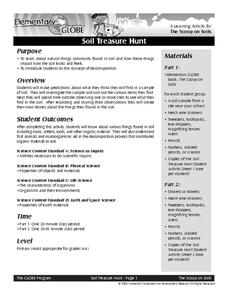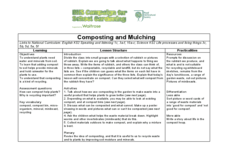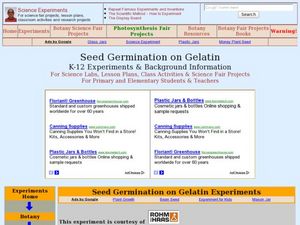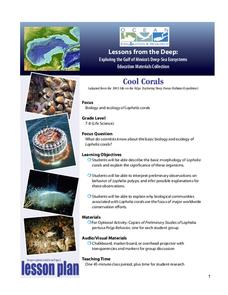Curated OER
Microorganisms: Good Guys or Bad Guys?
Learners discover the role microorganisms play in our lives. In this decomposition lesson, students examine decaying foods and plants in order to analyze the different bacteria that grows. Learners discuss the good and bad of...
Teach Engineering
Clean it Up!
Harness the power of bacteria. Scholars see how using organisms that exist in nature can help solve human problems in the process known as bioremediation. They research and discuss several successful examples, such as using oil-eating...
Curated OER
Microorganism Multiplication
Sixth graders explore biology by viewing video clips in class. In this microorganism identification lesson, 6th graders identify the types of organisms that can feed small animals such as algae and protozoans. Students view video clips...
Curated OER
Microbe Experimentation
Sixth graders conduct a microbe experiment. In this microbe lesson plan, 6th graders develop an experiment with micro-organisms, complete the associated worksheet, and complete a table showing the results.
Curated OER
Things Living in a Pond
Ninth graders observe, compare, and classify various microorganisms using a microscope. They answer discussion questions, and record their observations on a chart.
Curated OER
Soil Treasure Hunt
Learners explore the concept of soil and decomposition. In this soil and decomposition lesson, students investigate bags of soil. Learners then learn how animals and other organisms help in the decomposition process.
Curated OER
Composting and Mulching
Second graders define composting and recognize what can be composted. For this composting and mulching lesson, 2nd graders classify objects or pictures as good or bad for composting. Students write a story about life in the compost heap.
Curated OER
Microorganism Multiplication
Seventh graders complete two experiments to learn about harmful and helpful microorganisms. In this microorganisms lesson, 7th graders read background information about fungi, yeast, and club fungi. Students then complete two experiments...
Nuffield Foundation
Making Up Nutrient Agars
A resource rich in information—and nutrients. Learners create agars for the purpose of cell cultivation in Petri dishes. The lesson provides instructions on how to create agars for the cultivation of different microorganisms.
Atkins
Attack of the Viruses!
Not all viruses are bad, but are all retroviruses groovy? The instructional activity starts with a detailed presentation before scholars create their own model of a virus. The resource incorporates many worksheets and practice questions...
Nuffield Foundation
Investigating Anti-Microbial Action
Join the fight against bacteria. An open investigation shows pupils different aspects of antimicrobial substances, such as disinfectants, deodorants, or plant oils. They design and conduct their own experiments on the effectiveness of...
Curated OER
Shake It!
Students examine plants and insects. In this plant instructional activity, students explore their surroundings on a nature walk. Students collect samples of plants and determine the different insects present.
Curated OER
Seed Germination on Gelatin
Students examine how seeds germinate in a culture. In this germination lesson students germinate seeds in gelatin and observe the growth of the plant.
Curated OER
Microbial Spoilers: The Impact of Microorganisms on the Shelf-life of Milk
Students are inroduced to a commonly used microbial culturing technique. They explore the role of microorganisms in determining the shelf-life of food products.
Curated OER
The Marvels of Mud
Young scientists roll up their sleeves and get a little dirty in this three-day earth science investigation. Following the scientific method, children monitor the growth of algae in pond water samples in order to determine the role that...
NOAA
Deep-Sea Ecosystems – Cool Corals
Young oceanographers research deep sea corals that thrive on chemosynthesis. The lesson focuses on the biology of the animal, preferred habitat, associations, and interactions.
NOAA
Deep-Sea Ecosystems – Life is Weird!
A pool of brine in the deep sea can be up to four times as salty as the surrounding sea water. The deep sea ecosystem relies on chemosynthesis and the organisms that live there are often strange to us. The lesson focuses on researching...
NOAA
Importance of Deep-Sea Ecosystems – Chemists with No Backbones
Marine invertebrates offer us many new options for developing pharmaceutical drugs, such as w-conotoxin MVIIA, which is extracted from the cone snail and is a potent painkiller. The lesson encourages scholars to research various types of...
NOAA
Deep-Sea Ecosystems – Entering the Twilight Zone
Imagine an ecosystem without any light or oxygen, where living things convert carbon dioxide into food. This ecosystem is thriving and might just be the largest ecosystem on our planet, yet we know very little about it. The lesson...
NOAA
Importance of Deep-Sea Ecosystems – How Diverse is That?
When judging diversity of an ecosystem, both species evenness and species richness must contribute. After a discussion of diversity and a guided example using the Shannon-Weaver function, scholars use the same function on two other...
University of Washington
The Carbon Cycle
When it comes to the carbon cycle, the sky really is the limit. The lesson begins with observing a closed ecosystem in a bottle. Then, scholars discuss and answer questions on the carbon dioxide and oxygen cycles.
Science Matters
Crawly Composters
Get your hands dirty with an interactive instructional activity that showcases the process of decomposing and returning nutrients back into the soil. After building a compost pile, pupils regularly observe the...
US National Library of Medicine
Science and Society: Preventing the Spread of Disease
Looking for a valuable resource on the spread of infectious diseases? Here is a lesson in which pupils simulate the spread of diseases and learn about how to prevent them from spreading. Class members read case studies about diseases,...
University of Kentucky
Beneficial Bug Scavenger Hunt
Many people think of bugs as annoying pests to be squashed, but most insects and spiders are beneficial, eating the actual pests or pollinating plants. After reviewing some of the common bugs in your area (they may differ from those...

























